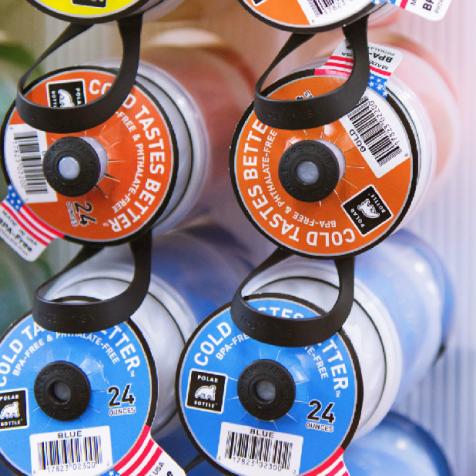
Company Details
Location
Boulder
Founded
1994
Ownership Type
Private
Employees
50
Products
Insulated water bottles
(a dba for Product Architects)
Boulder, Colorado
Founded: 1994
Privately owned
Employees: 50
The tradeoffs of being made in Colorado have sustained market-leader Polar Bottle, as competitors rush to copy their success.
Coming up on its 20th birthday, the Polar Bottle has emerged as the Kleenex of insulated water bottles: the brand name that's used for the entire segment. Knockoffs abound, but the company has stuck to its guns -- and its made-in-Colorado strategy -- since day one.
It's paid off: Polar Bottle sales are up 20 percent in 2013, says Judy Amabile, president and co-founder.
"A lot of the growth has come from a couple of new accounts, plus we've been steady in our current accounts," says Amabile.
That means that Polar Bottle is moving into sometimes unexpected retail channels "We're always looking for new avenues for growth," she explains. "We're in traditional bike shops as well as specialty sports stores. We're also in places like the Container Store, and hardware stores and chains. We take whatever comes our way, and if it works, we look for more."
What's the secret to the product's lasting appeal? "We were the first ones to come out with the insulated bottle," says Amabile. "The way we did it" a double wall and a liner -- "was definitely the way to do it. A lot of people have done it the same way since."
But Amabile says the Polar Bottle stands out amidst the competition. "It's a super high quality product. It lasts a really long time. There are people using the same bottles they bought 20 years ago."

This durability stems in large part from domestic manufacturing and private ownership, says Amabile. "We're competing with a lot of products made in China," she says. "We've gotten pretty squeezed" -- not just in terms of profit margins, but also when it comes to shelf space.
Amabile credits the lack of stockholders clamoring for growth with the ability to roll with such punches. "We run the business the way it suits us," she says. "It's a luxurious place to be."
"The trade-off between higher labor costs and more stringent environmental regulations is that Boulder's a beautiful place to be," she notes. "We are willing to pay to work in a place with a lot of stability. We don't want to be in a place without environmental regulations. We want to do the right thing -- we have kids and we don't want to exploit people."
With overseas manufacturing, inventory management is difficult and flexibility suffers. "We can just make it up as we go along," she says. "If someone wants all purple Polar Bottle, we can make all purple."
Amabile says Polar Bottle success stems from not only quality, but customer service as well, and that means servicing both end users and retail accounts. "We believe in our product and stand by it. We want to support the people that buy it, and that goes a long way with the retailers."
The company hasn't tinkered too much with the formula, changing its printing methods, growing its custom and private-label business, and expanding to three sizes over the years. Private-label customers include bike companies like Trek as well as unexpected brands like Victoria's Secret. "That's been a wonderful partnership," says Amabile of the latter. "They're super creative."
To handle the growth, the company is moving from its current 15,000-square-foot facility to a 37,500-square-foot space in Gunbarrel by the end of 2013. "We moved to where we are now three years ago," says Amabile. "It was twice as much space as we had before. We filled it up."
In its nearly 20 years of business, what's the cumulative output of Polar Bottles? Amabile is tight-lipped, but notes, "We've literally sold millions of bottles."
Challenges: Seasonality. With a big sales spike every spring and early summer, Polar Bottle has traditionally had employees to work overtime, but as of 2013 Amabile is using temporary labor to help handle the uptick. All that overtime "really burned people out," she explains.
Opportunities: "More and more people are paying attention to 'Made in America," says Amabile. "That's an opportunity. More manufacturing is going to come back to the U.S. That's good for us. It's better if there are more industrial designers and machinists."
Needs: A deeper talent pool. "There's a lot of competition for scarce resources now," says Amabile. "It will self-correct over time."

